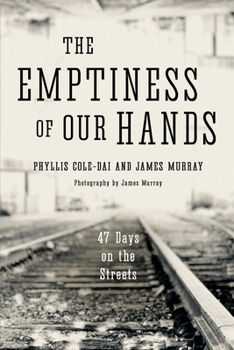The Emptiness of Our Hands: 47 Days on the Streets
Select Format
Select Condition 
Book Overview
In 1999 Phyllis Cole-Dai and James Murray lived by choice on the streets of Columbus, Ohio, the fifteenth-largest city in the United States. They went to the streets with a single intention: to be as present as possible to everyone we met, offering them sustained and nonjudgmental attention. Such attention is the heart of compassion. This book chronicles their streets experiences. It will thrust you out the door of your comfortable life, straight...
Format:Paperback
Language:English
ISBN:0692080856
ISBN13:9780692080856
Release Date:March 2018
Publisher:Bell Sounds Books
Length:308 Pages
Weight:1.05 lbs.
Dimensions:0.7" x 6.0" x 9.0"
Customer Reviews
4 ratings
A Tale of Two Courageous Fools
Published by Thriftbooks.com User , 16 years ago
This record of the experience of intentionally living on the streets as a spiritual practice reminded me of the extremes of loneliness I have undergone, and of how opening the heart is the only way through. An articulate report of our shared humanity with the very ones we tend to make "other" and in taking on the mantle of their hardship, these two on pilgrimage learned how deeply we are they. James' pin-hole photgraphy captures more than images; they translate the brilliance of any given moment as well as the depths of obscuration and dark hopelessness that homelessness engenders.
Why?
Published by Thriftbooks.com User , 19 years ago
Ash Wednesday, 1999, Columbus, Ohio. Two friends, Phyllis and James, leave Phyllis' house, pull the door closed, and the lock latches behind them. They have no key to reenter, for they are leaving their homes, and all the comforts of home, family and friends, to spend the 47 days of Lent and Holy Week as homeless persons, walking the streets by day and spending their nights on the street, in the homeless shelters, then in their own makeshift shelter in a hobo town along the railroad tracks. Why? They are not, either of them, entirely sure when they set out. Phyllis only knows that she must; James offers to accompany his friend, and we can guess at the mix of feelings he experienced when his offer was accepted. Why? Phyllis tells us, quoting Annie Dillard in the Prologue, that "This is not a thing that I have sought. But it has come across my path and I have seized it." And they do seize it, though at times they must have felt seized by it. No longer wrapped in the trappings of who they have known themselves to be, they take on a kind of invisibility; the invisibility of the homeless. The world - that world that you and I walk around in - does not see them, because they - because we - do not want to see them. Eyes are studiously averted. Children, who haven't yet learned that the homeless are invisible, are drawn sharply away as they pass on the sidewalk, by parents troubled to make even this degree of recognition. James builds pin-hole cameras with materials rescued from dumpsters, and takes pictures of their new world - the same world they'd occupied so recently, now changed almost beyond recognition. The pictures, fuzzy and murky by virtue of the primitive technology, are perfect illustrations for this book. Details are unclear, smudged, so our imaginations borrow from the imagery of the text to fill in the details, and gradually we feel ourselves more and more a part of - caught up in - their quixotic, compassionate odyssey. Phyllis, who is the principle author of the text, predicts this in her Prologue, when she says ". . . you'll be walking [the Lenten sidewalk] with James and me. . . . It will be there in your shivers, your insomnia, your sweat, your stink, your longings, your limp. Let it settle into the marrow of your bones, like a disease, and hope for recovery." One image captured by the pin-hole camera is a cinder-block wall outside the Holy Family Soup Kitchen, blank except for one word of graffiti spray-painted on its grimy surface: Why? The Emptiness of Our Hands has the wisdom and courage to leave us with this question unanswered. But the question asserts itself in our minds and in our hearts more keenly after we've walked the streets with Phyllis and James, and born witness to the unreasonable, indispensable persistence of their love.
Emptiness of our Hands/Fullness of our hearts
Published by Thriftbooks.com User , 19 years ago
The authors spent the 40 days of Lent and Holy Week 1999 living on the streets of Columbus, Ohio, being "present" to the homeless and destitute living there, under the radar of most notice. We learn much through their eyes about the "Christ is distressing disguise" we ignore in our own community. There is no simple do-gooder attitude here, but a deep reflection on the habits of the heart that often harden each of us in our attitudes and behavior towards others, especially those in long-term need. The authors listen and let the homeless speak, rather than talking about or down to them. The 30 b/w photos made with pin-hole cameras from street trash open a new lens on a familiar cityscape. In words and photos it is a map of the heart.
authentic presence
Published by Thriftbooks.com User , 19 years ago
Emptiness of Our Hands is rare witness to the ancient practice of presence and accompaniment. Phyllis and James allow themselves to transparently participate in the daily life of the streets of Columbus, Ohio. No stage. Just deep living articulated in raw honesty, without pretense. They invite us into a life-changing and perception-altering journey.






